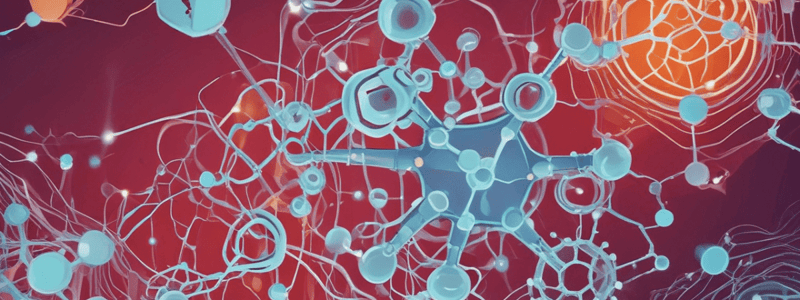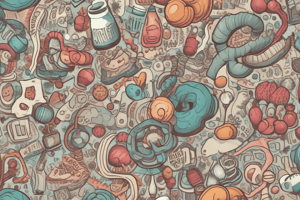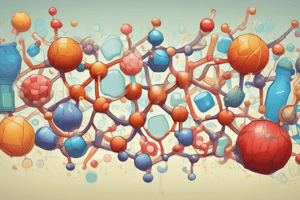Podcast
Questions and Answers
What is the layered structure of bacterial cell walls built from?
What is the layered structure of bacterial cell walls built from?
- Alternating units of cellulose and chitin
- Alternating units of protein and lipids
- Alternating units of GlcNAc and N-acetylmuramic acid (correct)
- Alternating units of starch and glycogen
What is the result of the elimination of water between the anomeric hydroxyl of a cyclic monosaccharide and the hydroxyl group of another compound?
What is the result of the elimination of water between the anomeric hydroxyl of a cyclic monosaccharide and the hydroxyl group of another compound?
- Formation of a peptide bond
- Formation of an ether bond
- Formation of an amide bond
- Formation of an O-glycoside (correct)
Which of the following glycosides is a cardiac glycoside and Na+/K+ ATPase inhibitor?
Which of the following glycosides is a cardiac glycoside and Na+/K+ ATPase inhibitor?
- Ouabain (correct)
- Sucrose
- Maltose
- Amygdalin
What is the stereoconfiguration of the sugar monomers involved in the formation of maltose?
What is the stereoconfiguration of the sugar monomers involved in the formation of maltose?
What is the common feature of all disaccharides involving the anomeric hydroxyl of at least one sugar?
What is the common feature of all disaccharides involving the anomeric hydroxyl of at least one sugar?
What is the type of linkage involved in the formation of sucrose?
What is the type of linkage involved in the formation of sucrose?
Which of the following disaccharides involves the anomeric hydroxyl of both sugars?
Which of the following disaccharides involves the anomeric hydroxyl of both sugars?
What is the importance of the order of the two monomer units in disaccharides?
What is the importance of the order of the two monomer units in disaccharides?
What is the key difference between conformational isomers and configurational isomers?
What is the key difference between conformational isomers and configurational isomers?
What is the role of sugar phosphates in metabolism?
What is the role of sugar phosphates in metabolism?
What is the product of mild oxidation of an aldose with alkaline Cu(II) (Fehling's solution)?
What is the product of mild oxidation of an aldose with alkaline Cu(II) (Fehling's solution)?
What is the result of enzyme-catalyzed oxidation of monosaccharides?
What is the result of enzyme-catalyzed oxidation of monosaccharides?
What is the significance of uronic acids in natural polysaccharides?
What is the significance of uronic acids in natural polysaccharides?
What is the equilibrium state of free aldonic acids in solution?
What is the equilibrium state of free aldonic acids in solution?
What is the class of compounds formed by the reduction of the carbonyl group on a sugar?
What is the class of compounds formed by the reduction of the carbonyl group on a sugar?
Which of the following is an important naturally occurring alditol?
Which of the following is an important naturally occurring alditol?
What is the primary reason why lactose is considered a reducing sugar?
What is the primary reason why lactose is considered a reducing sugar?
What determines the shape of an oligosaccharide molecule?
What determines the shape of an oligosaccharide molecule?
Why do different enzymes catalyze the hydrolysis of maltose and cellobiose?
Why do different enzymes catalyze the hydrolysis of maltose and cellobiose?
What is the purpose of the 'bent bonds' in drawing glycosidic bonds?
What is the purpose of the 'bent bonds' in drawing glycosidic bonds?
What is the correct sequence for writing the structure of a disaccharide?
What is the correct sequence for writing the structure of a disaccharide?
What is the term for the end of an oligosaccharide that has a potential free aldehyde group?
What is the term for the end of an oligosaccharide that has a potential free aldehyde group?
Why is sucrose considered a non-reducing sugar?
Why is sucrose considered a non-reducing sugar?
What is the prefix used to designate the anomeric form of a monosaccharide?
What is the prefix used to designate the anomeric form of a monosaccharide?
Where is hyaluronic acid synthesized in the body?
Where is hyaluronic acid synthesized in the body?
What is the function of heparin in the body?
What is the function of heparin in the body?
What is the characteristic of the cell wall of a Gram-positive bacterium?
What is the characteristic of the cell wall of a Gram-positive bacterium?
What is the cross-linking component in the cell wall of a Gram-positive bacterium?
What is the cross-linking component in the cell wall of a Gram-positive bacterium?
What is the function of hyaluronan in the extracellular matrix?
What is the function of hyaluronan in the extracellular matrix?
What is the characteristic of the cell wall of a Gram-negative bacterium?
What is the characteristic of the cell wall of a Gram-negative bacterium?
What is the cross-linking component in the cell wall of a Gram-negative bacterium?
What is the cross-linking component in the cell wall of a Gram-negative bacterium?
What is the structure of lipoteichoic acid?
What is the structure of lipoteichoic acid?
What is the primary function of transpeptidase enzyme in peptidoglycan synthesis?
What is the primary function of transpeptidase enzyme in peptidoglycan synthesis?
What is the mechanism of penicillin's action on the transpeptidase enzyme?
What is the mechanism of penicillin's action on the transpeptidase enzyme?
What is the result of penicillin's inhibition of transpeptidase enzyme on the bacterial cell?
What is the result of penicillin's inhibition of transpeptidase enzyme on the bacterial cell?
What is the specific component of penicillin that binds to proteins?
What is the specific component of penicillin that binds to proteins?
What is the effect of penicillin on the synthesis of peptidoglycans?
What is the effect of penicillin on the synthesis of peptidoglycans?
What is the consequence of the weakened cell wall due to penicillin's action?
What is the consequence of the weakened cell wall due to penicillin's action?
What is the specific mechanism by which penicillin leads to cell lysis?
What is the specific mechanism by which penicillin leads to cell lysis?
What is the primary target of penicillin's action?
What is the primary target of penicillin's action?
Study Notes
Monosaccharides
- Conformational isomers are distinguished from configurational isomers in that the former can interconvert without breaking and re-forming bonds.
- Epimers are stereoisomers differing in their configuration about only one asymmetric carbon atom.
Derivatives of Monosaccharides
- Sugar phosphates are important intermediates in metabolism, functioning as activated compounds in syntheses.
- Oxidation of monosaccharides can proceed in several ways, depending upon the oxidizing agent used, producing aldonic acids.
- Enzyme-catalyzed oxidation of monosaccharides gives other products, including uronic acids such as glucuronic acid.
- Uronic acids are important constituents of certain natural polysaccharides.
- Free aldonic acids, such as gluconic acid, are in equilibrium in solution with lactones, which are cyclic esters.
- Reduction of the carbonyl group on a sugar gives rise to the class of polyhydroxy compounds called alditols.
- Important naturally occurring alditols include erythritol, D-mannitol, and D-glucitol (also known as sorbitol).
- D-glucitol is part of bacterial cell wall, which is built from alternating units of GlcNAc and N-acetylmuramic acid, forming a layered structure called peptidoglycan.
Oligosaccharides
- Elimination of water between the anomeric hydroxyl of a cyclic monosaccharide and the hydroxyl group of another compound yields an O-glycoside.
- The acetal bond formed is referred to as a glycosidic bond.
- Two naturally occurring glycosides are Ouabain (cardiac glycoside, Na+/K+ ATPase inhibitor) and amygdalin (cyanide!), which are highly toxic glycosides produced by plants.
- Distinguishing features of different disaccharides include:
- The two specific sugar monomers involved, and their stereoconfigurations.
- The carbons involved in the linkage.
- The order of the two monomer units, if they are different kinds.
- The configuration of the anomeric hydroxyl group of each residue.
- Note the convention used to draw glycosidic bonds, where the “bent bonds” allow the Haworth projections of the monomers to be drawn in parallel.
Polysaccharides
- Hyaluronic acid is distributed widely throughout connective, epithelial, and neural tissues, and is unique among glycosaminoglycans in that it is nonsulfated, forms in the plasma membrane instead of the Golgi apparatus, and can be very large.
- Hyaluronic acid is one of the chief components of the extracellular matrix, and contributes significantly to cell proliferation and migration.
- Heparin is a highly sulfated glycosaminoglycan, appears to be a natural anticoagulant, and is found in many body tissues.
- Heparin binds strongly to a blood protein, antiprothrombin III, and the complex inhibits enzymes of the blood clotting process.
- The cell wall of a Gram-positive bacterium, S. aureus, consists of a thick peptidoglycan layer made up of polysaccharide chains and short peptides.
- The cell wall of a Gram-negative bacterium, E. coli, has a thin peptidoglycan layer and an outer lipid membrane.
Glycoconjugates of Interest
- The structure of a lipotechoic acid consists of D-Alanyl and NAG groups arranged irregularly on the chain, which is anchored in the membrane by lipid.
- The cross-linking reaction in peptidoglycan synthesis involves the action of a transpeptidase enzyme, which is inhibited by penicillin.
- Penicillin inhibits the completion of the synthesis of peptidoglycans by binding to proteins with the β-lactam ring, causing the cell wall to weaken due to fewer cross-links, and ultimately leading to cell lysis.
Studying That Suits You
Use AI to generate personalized quizzes and flashcards to suit your learning preferences.
Related Documents
Description
This quiz covers the structure of sugar molecules, including conformational isomers, configurational isomers, and epimers.




